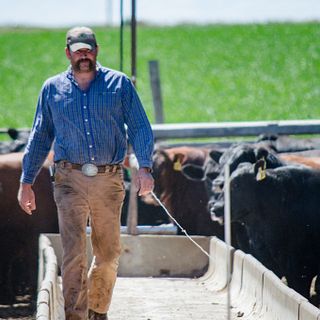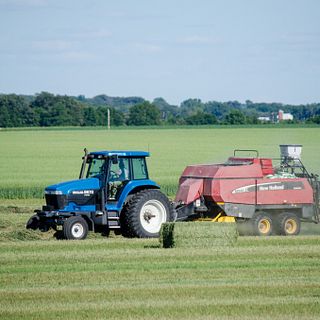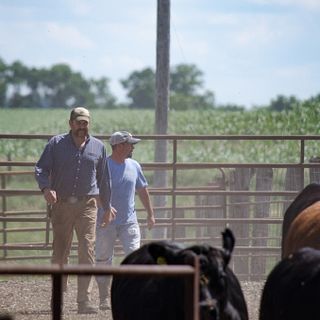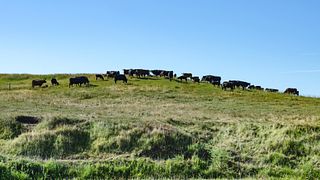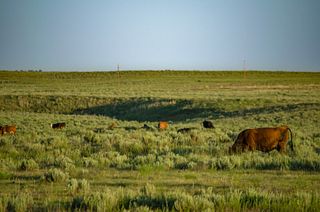
- Home
- Winner Gallery
- Inductees
- SFI, Inc.
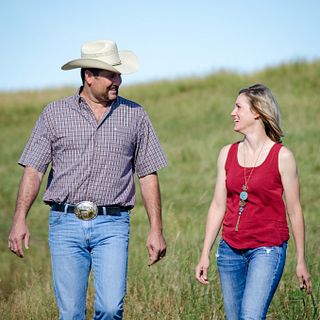
Year Inducted: 2017
Region III
Nemaha, Iowa
DENVER (July 13, 2017) – SFI, Inc., in Nemaha, Iowa, has been selected as one of six regional honorees of the Environmental Stewardship Award Program (ESAP). The award, announced during the 2017 Cattle Industry Summer Business Meeting July 13, 2017, recognizes the operation’s outstanding stewardship and conservation efforts. This year’s regional winners will compete for the national award, which will be announced during the Annual Cattle Industry Convention in Phoenix, Ariz., in February 2018.
Established in 1991 by the National Cattlemen’s Beef Association to recognize outstanding land stewards in the cattle industry, ESAP is generously sponsored by Dow AgroSciences, USDA Natural Resources Conservation Service (NRCS), U.S. Fish and Wildlife Service, and the National Cattlemen’s Foundation.
“Cattlemen and women everywhere understand that the land, air and water resources in their care are the cornerstone of their success and they are only stewards of those resources for a short time,” said National Cattlemen’s Beef Association President Craig Uden. “Each of us understands the importance of improving those resources and leaving them better for future generations. This year’s nominees are outstanding examples of what is possible for the beef industry and they serve as an inspiration for producers everywhere to continue improving their stewardship practices now and in the future.”
Operated by the Smith family, which consists of Lynn and Joy, son Seth and his wife Etta, SFI, Inc., is in the heart of the Upper Raccoon River watershed, where Lynn Smith’s family settled in 1886. Lynn began farming at SFI, Inc. in 1971 with Seth, following in his footsteps in 2001. Today, the farm consists of 1,900 acres of row crops, 510 acres of pasture, a 500 head feeder-to-finish hog barn, 210 cow-calf pairs and a 2,200 head feedlot.
“My dad’s dad came here from Illinois,” said Lynn, “and they settled a little west of here, so they’ve been there ever since. I think it’s been 130 years that the Smiths have farmed, or put a crop in.”
Lynn has been using conservation tillage on the farm since 1977, and SFI, Inc., operates on a “closed loop” of enterprises that support each other. The Smiths converted erodible land to pasture and rotationally graze to optimize efficiency. SFI, Inc., has cover crops that also provide fall and spring grazing worth $40 to $60 per acre. The farm is able to greatly reduce nitrate losses thanks to the use of in-season nitrogen applications, cover crops and composted feedlot manure.
The family planted 4,000 feet of windbreaks around the feedlot to protect the cattle, provide a habitat for wildlife and improve the aesthetics. SFI, Inc., also has monoslope feedlot barns that keep rain off the cattle and manure to reduce runoff. Corn stalks provide bedding for the feedlot, and, when composted with manure, provides SFI, Inc., with most of their fertilizer. Water from the feedlot lagoon is recycled via an irrigation pivot onto row crops and serves as fertilizer as well, and a wash bay with a pit captures nutrients from trucks and equipment for recycling.
“The Smiths are just great stewards of the land,” said Jim Frederick, a retired assistant state conservationist for NRCS, “and it’s going to be generational. They’re always willing to teach, and always willing to learn; that’s a good combination to have.”
“The desire to leave the land better than they found it is a common trait among cattle raisers,” says Dave Owens, beef marketing specialist with sponsor Dow AgroSciences. “You certainly see that in action in the Smith family. They’re making a real, on-the-ground difference in protecting and improving the environment.”
SFI, Inc., is located in the drainages, which were targeted by the 2015 Des Moines Water Works lawsuit, which blamed farmers for high nitrate levels in the water. The suit has since been dismissed, but even before the suit the Smiths were focusing on efforts to improve water quality. The Smiths have surpassed regulations to build a double containment system for fuel and feedlot manure. The system has kept containments from streams, even when a tornado opened a valve.
The Smiths are also always looking for ways to share their stewardship story, even providing the beef for the burgers served at a nearby restaurant with a menu that educates consumers about SFI, Inc., and its environmental practices.
The Smiths continue to implement and try new stewardship practices every year, knowing that the changes they implement today will help ensure their farm is around for generations to come.
“I feel like we owe that to the generations prior to us that did a lot of these things that we get to enjoy,” said Seth. “It’s our job to continue that, to pass that on so that every generation that comes along makes things a little better.”
